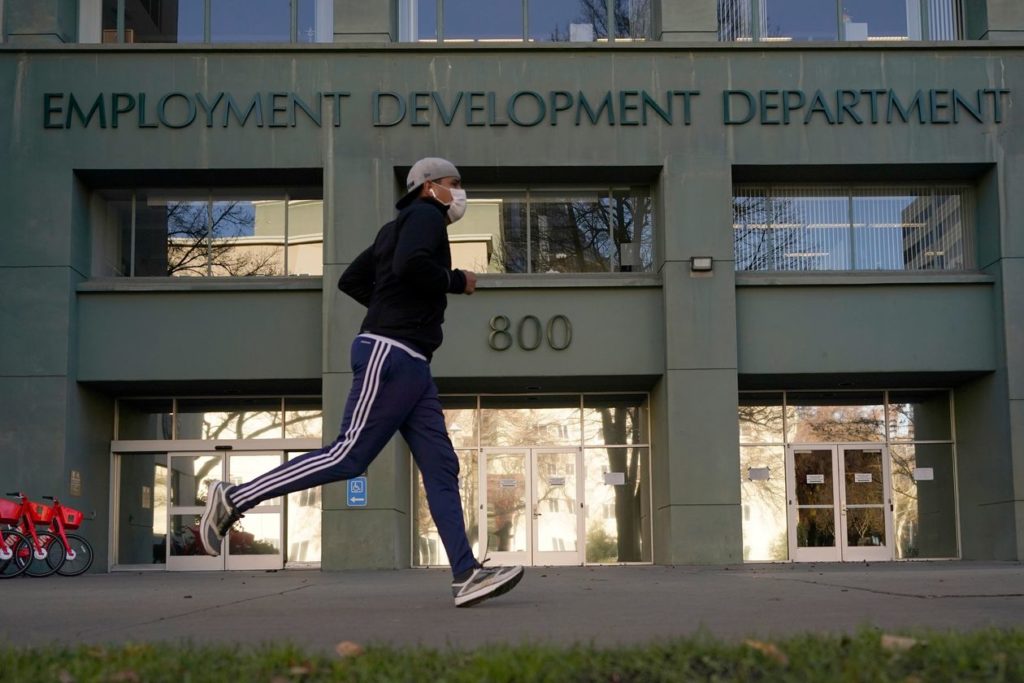Below is a review of the posts (on Facebook, LinkedIn, and Twitter) from the past week. You can check out the full posts by clicking on the links.

(PHOTO: RICH PEDRONCELLI/ASSOCIATED PRESS)
In the post on Sunday 2/14/21, as COVID rages, the question is: are you eligible for unemployment benefits if you refuse a job? The answer is, it depends. If the employer has in place protocols deemed reasonable for its setting and an employee refuses to return, then there is probably no eligibility for UC. Other things could play into the answer, such as whether the protocol is indeed reasonable in that workplace, if the employee has requested an accommodation, and much more as noted in the post.
TAKEAWAY: UC eligibility for failure to return to the workplace is based in large part on the facts of each individual situation; if you need assistance, contact an employment lawyer.

The post on Monday 2/15/21 noted that working from home brings tax implications for employers and employees. Especially important now that it is tax return season. The first thing to think about is to what state(s) taxes are due. If, for example, the employer is in State 1 and the employee is working from their home in State 2, then taxes might be due in both states. See the post for the types of taxes implicated and whether or not the usual rules have been waived or adjusted due to COVID. What other issues or questions might arise? Wage and hour rules, employment termination considerations, noncompete agreements, and more as noted in the post. The employer might also need to broaden its workers’ comp insurance if more than one state is now involved; the same for unemployment compensation insurance. Bask to tax implications. Employers can deduct the cost of supplies they purchased for employees working remotely; likewise, if the employer reimbursed the employee for the purchase of supplies, then the employer gets the deduction. What about employees? They might be taxed twice on their wages if the state in which they reside doesn’t give a credit for taxes paid in the employer’s state. There is also a home office wrinkle caused by the Tax Cuts and Jobs Act of 2017 – see the post as to how it may affect remote workers. And then there’s relocation and the effect it can have on tax returns – for employers and employees. See the post for more details.
TAKEAWAY: Contact an employment lawyer and accountant for questions on taxes and any COVID-related exemptions/credits/waivers.

The post on Tuesday 2/16/21 reminded you to avoid violating these 9 homeowner and condo association rules that could cost you. You know life in an homeowners’ or condo association comes subject to certain covenants, conditions and restrictions. There are things that must be done by owners and things that owners cannot do. These things might change from time to time. Violations by owners tend to fall into 9 to categories, the first of which is landscaping. Know that can and cannot be planted and where; fines may be assessed or whatever change was made in violation of the restrictions may be undone and the cost charged back to the owner. Often there is also a limit on the number, size and type of vehicles and where they may or must be parked. As with landscaping, violations might lead to fines or the vehicle being towed at owner’s expense. Rentals are another category where there are many violations. There might be a cap on the number of units available as rentals, a minimum lease length, and more, so know the rules and restrictions. Pets are another big area where there are many violations; associations can set numerical and weight limits as well as limit the type of pets and where they can be, when, and how. However, pets also bring with them many accommodation issues, so know the law or get legal assistance. The other 5 top categories of violations are noted in the post with details. Also in the post are examples of what the association might be able to do if there is a violation and options for the owner in response.
TAKEAWAY: Life in a planned community can be great, but know what your rights and obligations are. Consult a community association lawyer for assistance.

From the post on Wednesday 2/17/21 we learned that condo and homeowner associations may be able to limit guest access due to COVID-19. This authority may stem from the association’s Governing Documents (Declaration, Bylaws, Rules/Regulations), so review them carefully. If there is no relevant language in the Governing Documents, then they may need to be amended. See the post for more details.
TAKEAWAY: The Governing Documents of an association are not static, but can be amended if necessary – again, consult a community association lawyer for assistance and guidance.

In the post on Thursday 2/18/21 we learned why you should not share photos of your COVID-19 vaccine card. Yes, you are proud of taking action to protect yourself (and possibly others). But how you show that pride is a different beast altogether. Don’t post the card itself – it might contain a lot of personal information, including date of birth and so much more as noted in the post. And when a scammer has the information from your card, they create and sell fake cards. Ugh. But that’s not all – there is more fallout that can occur from posting your vaccine card – see the post.
TAKEAWAY: Social media is great to share news, but you don’t always want to share everything. Be careful in the wild west that is socmedia.

The post on Friday 2/19/21 was a reminder that cannabis companies should address labor & employment issues including job classifications, COVID19 and unions. Marijuana is not legal – either for medical use or recreational use – in every state, but in those where it is, the companies need to be aware of laws that affect other businesses too and their obligations under those laws. Issues that often come up include classification and compensation of workers, sexual harassment, unionization and COVID-related issues. Union organizing is increasing in the cannabis industry and there are now unions in Pennsylvania and other states in the industry. The employers must know what is required under the union agreements and applicable state and federal law as noted in the post. And speaking of federal law, cannabis businesses must know how to classify employees – that in turn may well determine how much they are paid and other things detailed in the post. Misclassification would lead to suit and having to pay penalties or more. COVID-related issues are also center stage now for cannabis businesses, just as other companies; some of the things they must keep in mind are noted in the post. Finally, the post talks about how to protect companies against these and other issues – see the post.
TAKEAWAY: Cannabis businesses are still businesses and, as such, subject to various state and federal laws. Know the law and get legal assistance before it is needed.

Finally, in the post yesterday 2/20/21, we saw that worker cash for vaccine incentives boom despite legal questions. This post follows on our 2/11/2021 post. Vaccines are here, but whether or not they should be mandated is not an easy issue to address. Companies are offering up incentives for employees to get vaccinated, but that raises the question as to whether an incentive can be “too good” that it is deemed discriminatory against those who cannot get vaccinated. The EEOC has withdrawn its proposed wellness rules issued January 7, 2021. Those rules allowed (in relevant part) de minimis incentives for participation in wellness programs (which might have been extended to cover COVID vaccines). So now employers are back to square one and having to feel their way around the incentive question, including possible discrimination and how to accommodate employees upon request (all as discussed in the post). Examples of what some companies have offered are in the post.
TAKEAWAY: Decide what will be required in your workplace and how you will get to that point; discuss with an employment lawyer any landmines along the way.

 York, Pennsylvania 17403
York, Pennsylvania 17403